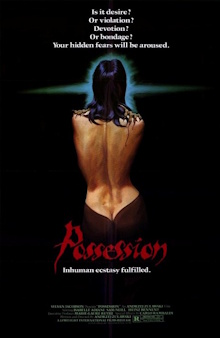This film is most often described as psychological horror but it really defies genres. It’s also hard to categorize in other ways as well, being an English-language film made by a Polish director that is set in Germany and features mostly European performers. One thing that’s certain is that it’s a genuinely horrifying film, if only due to Isabelle Adjani pushing her performance to extreme lengths. Critics have been struggling since it was made to make sense of it and I think it’s not really possible to nail it down to some particular intent on the part of the director but watching it is certainly an engrossing and disturbing experience.
Mark returns to his home in Berlin after being away on assignment. His wife Anna seems to have doubts about their marriage but is unable to say why. Mark lets her have the apartment with their young son Bob and goes out on a destructive drinking binge. He returns to find Bob alone and neglected. He later learns that Anna has run away to her lover Heinrich who seemingly gives her great sex. When Mark confronts Heinrich at the latter’s apartment, he is beaten up, proving that Heinrich is superior in every way. Anna still returns occasionally to check on Bob but Mark’s confrontations with her becomes increasingly violent. Mark hires a private investigator to follow her movements and learns that she actually has a flat of her own in a derelict building. The investigator contrives an excuse to check the sparsely furnished interior of the flat and is shocked to find a grotesque, tentacled monster living there. However before he is able to report it to anyone, Anna kills him with a broken bottle.
It’s common in horror films to wonder if the seemingly otherworldly elements in them are real or psychological constructs in the minds of the characters. Here, even before the appearance of the creature, there are clues that things aren’t quite right: the mysterious nature of Mark’s work and how he is assigned to an unnamed subject, the fact that Bob’s teacher at school Helen looks identical to Anna except for differently colored eyes, Anna’s own increasingly unhinged behavior. While some critics continue to claim that even the creature must be a psychological construct, I think the subsequent escalation of events rule out any possibility that this is all just in the mind. Towards the end, the film practically shifts genres into an action movie complete with shootouts. It is incredibly effective in that the film never fails in keeping the audience unbalanced. The strange dialogue they employ, talking around things rather than addressing what is right in front of them, makes it more disturbing. So are other details such as Heinrich’s mother being unusually attached to him and permissive of whatever he does. There’s body horror, sheer unbridled insanity, outright murder, horrific sex and much more with no holds barred.
It’s harder to decide if the confluence of events makes sense as a whole. Elements like Mark seemingly being replaced by a man who sexually satisfies Anna while also being a physically stronger and more urbane man complement the later appearance of actual doppelgängers. The breakdown of their marriage is perhaps meant to echo the divide between West and East Berlin with imagery of the wall being featured prominently in many shots. While it’s possible to interpret these details as metaphors for the Cold War setting and they do serve to impart a sense of deep meaning to the film, I don’t think that there is any larger story to be told. Director Andrzej Żuławski drew inspiration from his own messy divorce and his own life in Poland, bringing together loosely related themes to create a superlative horror film that is more than the sum of its parts. To do this, he also pushed both of the lead actors to their limits, so in a way the distress that we see so clearly on the screen is real.
This is an amazing film which skirts the line between the artistic and the crass so very finely. It’s all loose dream associations however. I usually prefer something more coherent to dig into so it’s not going to be among my favorites so I’m not certain if I’m interested in the rest of Żuławski’s work.
